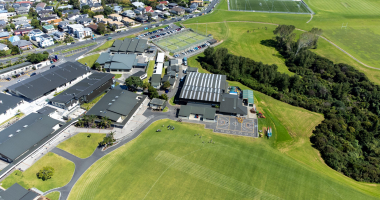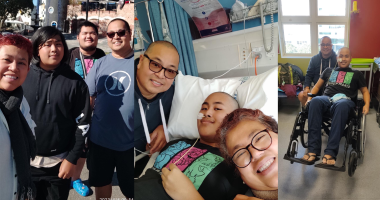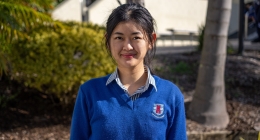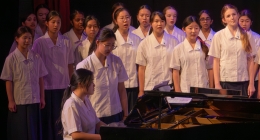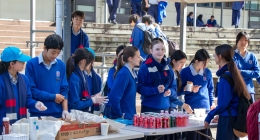At China’s prestigious Tsinghua University, there is a saying that goes, “Without sports, there’s no Tsinghua” (無體育,不清華). If Macleans had an equivalent saying, it would likely be along the lines of “Without academics, there’s no Macleans”.
Macleans’ focus on academic achievement is exemplified by the consistent student success in attaining NZQA scholarships, which are often regarded as the most prestigious academic honour for kiwi students. Though typically pursued by students in their final two years of school, these scholarships often capture the attention of younger, ambitious learners. But, is taking on this challenge before Year 12 a smart move or an unnecessary stressor?
Advantages of sitting NZQA scholarship
Academic growth
Since scholarship goes beyond NCEA Level 3, it requires a deeper level of critical thinking and problem-solving. Thus, engaging with the scholarship content can help students develop a more nuanced understanding of complex concepts in their subject(s) of choice, allowing them to approach their regular studies with greater confidence and insight.
Additionally, this can pay dividends to a student’s academic pursuits. This is because the rigorous preparation process for sitting scholarship exams helps students refine their study habits and time management skills as they learn to encode a wide range of topics and balance such commitments with regular schoolwork.
Academic recognition
Every year, Macleans hosts its Scholar’s Assembly, where it celebrates the success and dedication of high-achieving students who have studied the CIE or NCEA curricula. This includes students who have earned scholarships, even if they did not sit the exams as a year 12 or 13.
A unique aspect of Macleans’ academic recognition system is the white castle. This special accolade is presented to students who have represented the school at the highest level in academics, including those who have earned scholarships, serving as a symbol of academic excellence.
Free food!
One of the unexpected parts of scholarship for many students is the availability of food. While it’s not really an academic benefit, being able to enjoy sweet treats, juice boxes or muesli bars after pulling yourself out of bed in the morning or after a long day of school can be a major morale boost during those tutorials.
At meetings, students might even be treated to chocolates and muffins, making the rigorous chase for scholarships a bit more enjoyable.
Disadvantage of sitting NZQA scholarships
Early mornings and late afternoons
Unlike students in years 12 and 13, younger students unfortunately don’t get the benefit of timetabled scholarship tutorials. This means the only way for students below year 12 to access tutorials is by attending morning or afternoon sessions, which presents its own set of challenges.
On the one hand, morning tutorials take time well before school begins, starting more or less around 7:30 am. For many students, this can be a significant hurdle as waking up at the crack of dawn can lead to fatigue or decreased concentration throughout the regular school day.
On the other hand, there are afternoon tutorials, which typically run until 4:30pm. These extended days can clash with extracurricular activities like sports or cultural groups that many students are involved in. This conflict may force students to make difficult choices between pursuing scholarships and maintaining a well-rounded high school experience.
Knowledge gaps
Often, students who wish to attempt scholarship earlier on have yet to receive exposure to the depth of content at the scholarship level, especially in STEM subjects. Take scholarship statistics, for example, which contains topics like poisson distribution, something students are not exposed to until A Level mathematics or Level 3 statistics. But even less quantitative subjects like geography demand more than just an understanding of concepts as they typically have a focus on exam techniques like essay writing or incorporating graphs into explanations, which may not be covered at the same depth in the junior or MCert curricula.
For this reason, it could be difficult to grasp certain concepts when students haven’t developed a solid understanding of the building blocks that make these concepts digestible. In some cases, teachers may recommend younger students to come back in the future when they have studied a subject further.
Self study, self study, self study
In addition to the timing of tutorials, they are only held once a week. Consequently, a great deal of self-study is usually required in between sessions for students to fully grasp the content they are expected to know, which can sometimes be overwhelming. Moreover, some subjects like earth and space science do not have tutorials at all, so students are expected to self-study the exam content completely.
This can eat into valuable time that students might otherwise use for homework, relaxation, or social activities. Additionally, it can be challenging for younger students who may not have fully developed their independent learning skills, making scholarships more daunting, especially for complex subjects such as calculus.
Ultimately, the decision to pursue Scholarship before Year 12 should be based on a student’s individual circumstances, such as academic strengths, long-term goals and day-to-day schedules. It’s important to remember that scholarship is not the only path to academic success, and the primary focus for students at the end of the day should be on their main curriculum.
However, if you are one to take up a challenge, it is worth discussing the option with subject teachers and SAS to make an informed choice. And if you are ready to commit, you can contact Mrs Power or Ms Yu in Rutherford for more information.
23rd March, 2025
Written by Aaron Huang edited by Chiron Yung and Emma Li
Photo by Dan Dimmock on Unsplash


